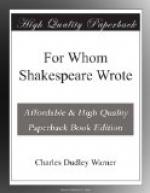as these there is not one lacking. Nature appears
here in all its violence, but also in all its fullness.
If nothing has been softened, nothing has been mutilated.
It is the entire man who is displayed, heart, mind,
body, senses, with his noblest and finest aspirations,
as with his most bestial and savage appetites, without
the preponderance of any dominant passion to cast him
altogether in one direction, to exalt or degrade him.
He has not become rigid as he will under Puritanism.
He is not uncrowned as in the Restoration.”
He has entered like a young man into all the lusty
experiences of life, every allurement is known, the
sweetness and novelty of things are strong with him.
He plunges into all sensations. “Such were
the men of this time, Raleigh, Essex, Elizabeth, Henry
VIII himself, excessive and inconstant, ready for
devotion and for crime, violent in good and evil, heroic
with strange weaknesses, humble with sudden changes
of mood, never vile with premeditation like the roisterers
of the Restoration, never rigid on principle like
the Puritans of the Revolution, capable of weeping
like children, and of dying like men, often base courtiers,
more than once true knights, displaying constantly,
amidst all these contradictions of bearing, only the
overflowing of nature. Thus prepared, they could
take in everything, sanguinary ferocity and refined
generosity, the brutality of shameless debauchery,
and the most divine innocence of love, accept all
the characters, wantons and virgins, princes and mountebanks,
pass quickly from trivial buffoonery to lyrical sublimities,
listen alternately to the quibbles of clowns and the
songs of lovers. The drama even, in order to
satisfy the prolixity of their nature, must take all
tongues, pompous, inflated verse, loaded with imagery,
and side by side with this vulgar prose; more than
this, it must distort its natural style and limits,
put songs, poetical devices in the discourse of courtiers
and the speeches of statesmen; bring on the stage
the fairy world of opera, as Middleton says, gnomes,
nymphs of the land and sea, with their groves and
meadows; compel the gods to descend upon the stage,
and hell itself to furnish its world of marvels.
No other theatre is so complicated, for nowhere else
do we find men so complete.”
M. Taine heightens this picture in generalizations
splashed with innumerable blood-red details of English
life and character. The English is the most warlike
race in Europe, most redoubtable in battle, most impatient
of slavery. “English savages” is what
Cellini calls them; and the great shins of beef with
which they fill themselves nourish the force and ferocity
of their instincts. To harden them thoroughly,
institutions work in the same groove as nature.
The nation is armed. Every man is a soldier,
bound to have arms according to his condition, to exercise
himself on Sundays and holidays. The State resembles
an army; punishments must inspire terror; the idea
of war is ever present. Such instincts, such




